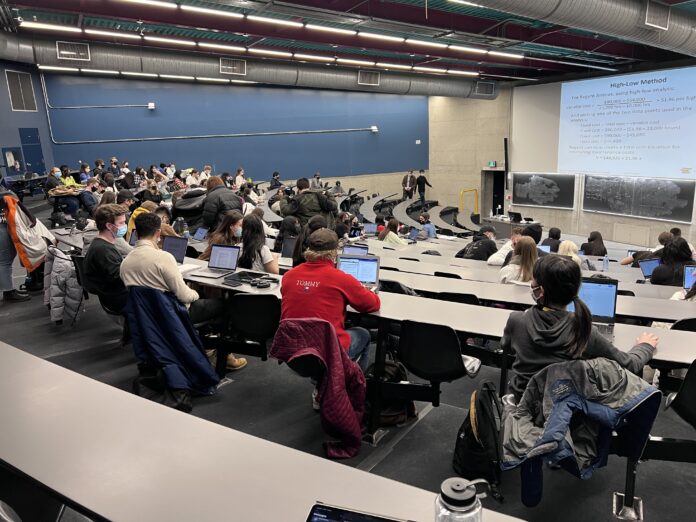After almost two years of remote learning, the University of Waterloo finally returned to pre-pandemic levels of in-person activity on Feb. 28, 2022.
Various concerns have arisen about this return, especially with the administration’s decision to no longer require professors to provide remote learning options to students.
“Honestly, returning fully to in-person is great. I think the university has been really trying to make sure that studying in-person is safe for everyone, both the staff and students,” first-year geomatics student Yesha Masani said.
However, Masani still emphasized the importance of keeping options open. “I think that remote learning is important for those who cannot make it to classes due to certain circumstances such as medical issues. It’s important to consider the state of those who want to study but are facing problems,” Masani said.
Several other students also voiced their opinions on the matter. Lizzie, a first-year environment and business student said, “I do think that remote learning options should continue, even after our move to in-person classes. Including remote learning options would make learning much more accessible and put provisions in place should anyone fall ill with COVID.”
In an email sent to the UW community on Jan. 21, 2022, Vivek Goel, President and Vice-Chancellor of UW and James W. E. Rush, Vice-President, Academic & Provost of UW explained their desire to support students and provide the most meaningful university experience possible, saying “In deciding to return to [an] in-person experience in February, we are striving to meet the needs of our students to have a meaningful university experience. We also want to make sure that the transition for our employees is clear and transparent.”
In their extended statement on the UW website, Goel and Rush highlighted the various health precautions being taken by UW for the safety of their faculty and students. These precautions include vaccine mandates, improved ventilation systems and mask mandates. They believe that these safety measures enable the UW community to continue with a fully in-person return without remote learning options.
Not requiring professors to offer remote learning options is also placing a toll on international students due to differing COVID-19 restrictions in various countries. It is also negatively affecting people with underlying health issues, who are at higher risk of catching the virus, and do not feel safe on campus, even with additional safety measures in place.
“I have not been able to make it for in-person learning. If there is no remote learning option, I may have to put health at risk to come to the university to study or I may have to choose health over education and drop this semester which will affect my future plans,” said anonymous.
Additionally, with such short notice for an in-person return, students struggled to find housing in the region for the Winter term. Due to the ongoing housing crisis, students have been left with undesirable options to either live close to campus and pay very high prices, live in unsafe areas, or live further away from campus and commute.
Faculty at UW have also raised their concerns on this decision. Many feel that their voices were not fairly included in the decision-making process. On Jan. 25, 2022, the Faculty Association of the University of Waterloo (FAUW) posted the following on their blog: “Many of our members have expressed concerns over the last weeks and months about what is required for a safe return to campus…and we have shared these concerns with the administration. Despite this, neither the Association leadership nor faculty members collectively have been consulted about returning to campus, this time or any previous time.”
A professor from the Faculty of Environment at UW also shared his opinions on the discontinuation of compulsory remote learning options, explaining that “having compulsory in-person requirements, which is what the administration announced as policy, makes it difficult to navigate that [health safety if someone gets sick] as a professor.”
Even though remote options are not required, the professor said, “I am going to continue posting those [recorded videos online and options for students studying remotely] as best as I can.
“Overall, there needs to be an allowance for more flexibility with some of the wider range of issues students are facing during this ongoing pandemic and transition to in-person learning,” he added.
Similar sentiments have been expressed by professors across the province. In the Ontario Confederation of University Faculty Associations (OCUFA) statement issued on Jan. 24, 2022, Sue Wurtele, President of the Ontario Confederation of University Faculty Associations said, “Since the beginning of the pandemic, university administrations have developed the bad habit of making decisions about campus health and safety behind closed doors and circumventing existing shared governance bodies that include the voices of campus unions.”
“Given the increased danger of campus outbreaks with the Omicron variant, it should be obvious that this cycle can’t continue. It’s time to take the safer path, which requires full transparency about campus health and safety issues and accountable governing bodies that include experts from campus unions,” Wurtele added.
UW addressed faculty concerns in a statement released on Jan. 31, 2022, where they said, “In a letter to administration, the Faculty Association of the University of Waterloo suggested that faculty be granted autonomy to consult with their students and to decide whether their courses should continue online or in-person. In our response, we respectfully disagreed. We believe a return is not only appropriate but an obligation to our students — the vast majority of whom chose this university for the experiences only in-person learning can provide.”
WUSA has also been advocating for options to ensure learning is accessible for everyone. They have been pushing for more availability of on-campus spaces to be opened for students, but also for remote learning options for students who are unable to be on campus.
Students and faculty members may take some time to adjust to UW’s decision to discontinue permanent remote options. Although UW is considering some faculty concerns, they are not publicly considering mandating remote options for students who are unable to access campu































